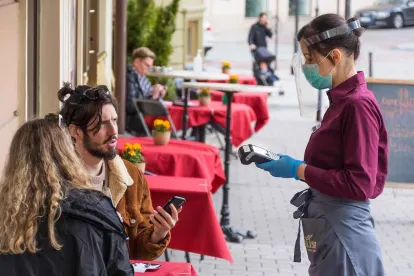COVID-19 vaccinations are front of mind for restaurant employers looking to return to “normal” in what has been a hard year for the industry. The potential for employee vaccination comes with many questions. Adding to the confusion: vaccine eligibility for restaurant employees varies from state to state, and the timing of eligibility remains unknown in most states.
Despite many uncertainties, there are steps restaurant employers can take now to prepare for vaccination eligibility.
1. When will restaurant employees be eligible for vaccination and what do restaurant employers have to do to confirm employment status?
The answer on eligibility depends on the state. Some states have indicated that restaurant employees are, or will soon be, eligible for vaccination as part of “Phase 1b.” For instance, in early February, New York announced that restaurant workers could begin being vaccinated. Colorado also added restaurant workers to group 1b but has broken 1b into subcategories; restaurant workers will soon be eligible for vaccinations after those over 65 have generally been vaccinated.
Other states (including Delaware, Iowa, and Massachusetts) have indicated that restaurant workers could soon be eligible. South Carolina and Ohio have indicated they are reviewing requests to move restaurant workers up in their vaccine plans. The National Restaurant Association’s ServSafe team tracks each state’s plans: Restaurant Industry State Vaccine Tracker.
However, vaccine availability is a separate issue. In New York, for example, eligible restaurant workers have not necessarily been able to get appointments to be vaccinated.
States likely will require employees to provide proof that they are a restaurant worker to qualify. However, what type of proof will depend on the state. Most state vaccination programs leave the vaccination initiation process to workers; meaning, once eligible, the employee can initiate making an appointment on their own. A few states (such as Connecticut) may require employers to initiate the vaccination eligibility process with the state for eligible workers. While logistics remain largely unknown, as with the healthcare industry, restaurants are expected to provide a company letter confirming the employee’s employment status. Employers should review the applicable jurisdiction’s requirements and monitor for additional information.
2. Can restaurants require all of their workforce be vaccinated?
Under federal employment law, it appears a COVID-19 vaccination mandate likely will be permissible for many employees. However, restaurants may need to consider making exceptions, either as a reasonable accommodation or because a vaccination mandate may have an unlawful disparate impact for employees in certain protected classifications. Mandating (rather than encouraging, recommending, or incentivizing) vaccinations, therefore, carries various legal and practical considerations. Restaurants also must consider more protective state or local laws, potentially requiring restaurants to vary vaccination policies by jurisdiction. For further insight into mandatory vaccination considerations, see To Vaccinate Or Not To Vaccinate… That Is The Question.
Industry studies suggest restaurant employees may be reluctant to be first in line for vaccination. Restaurants should consider the impact a mandatory policy may have on employee relations, morale, and staffing.
Restaurants should consider what type of vaccination policy, if any, they may implement and begin preparing for employee eligibility. Many restaurant employees have questions about eligibility and their employer’s policy on vaccination. While eligibility may take time, employers can begin crafting policies and messaging to employees now. If restaurants mandate vaccinations, they also should assess carefully any obligations to pay employees for time spent receiving vaccinations.
3. Short of mandating vaccination, what incentives can restaurant employers provide to encourage vaccination, especially as studies suggest many may not choose to vaccinate once eligible?
News abound about incentives, bonuses, or other perks for employees choosing to be vaccinated. Many in the industry are considering potential incentives. For instance, some restaurants consider offering employees extra pay (i.e., four extra hours of pay) to encourage employees to take time to get vaccinated. Others may offer additional paid time off in case of any side effects from the vaccine. Gift cards or other smaller incentives for vaccination also may be an option under the right circumstances for some restaurants. Like other issues concerning vaccination, incentives are also rife with legal and practical considerations. Restaurant employers should consider the nature and amount of an incentive and whether the incentive’s design triggers Americans with Disabilities Act (ADA) rules regarding voluntary wellness programs. Vaccination incentives may be considered part of a wellness program, which are part of the company’s group health plans and such incentives could implicate various state and federal laws. Similarly, requiring proof of vaccination to receive the incentive carries a host of confidentiality, privacy, and other legal considerations. Depending on how the incentive is crafted, there may be wage and hour implications, as well as accommodation issues, to consider.
4. Can restaurant employers ask employees if they have been vaccinated and request proof?
Recent Equal Employment Opportunity Commission (EEOC) guidance states that employers may ask for proof of COVID-19 vaccination without engaging in a disability-related inquiry. However, there are practical and legal considerations, including maintaining vaccination records as confidential medical records. Before collecting proof of vaccination from employees, restaurants should consider:
- What is the purpose of collecting this data? What do they plan to do with it?
- How will it be collected and maintained?
- Are there adequate privacy and confidentiality safeguards surrounding collection and storage?
- Any other state or local law obligations.
5. Can restaurant employers ask applicants if they have been vaccinated or mandate vaccination for new hires?
Recent EEOC guidance states that employers may ask applicants if they have been vaccinated without violating the ADA, as long as the applicants have received a conditional offer of employment and the ADA’s other requirements for post-offer medical inquiries are followed. Employers have broad latitude with respect to disability-related questions after a conditional offer of employment has been made, provided the same questions are asked of all entering employees in that job category. As with employees, however, before restaurants withdraw employment offers from applicants who are unable to be vaccinated due to a disability or sincerely held religious belief, they may need to consider whether a reasonable accommodation is available and they may need to defend the vaccination mandates as being job-related and consistent with business necessity. If an employer chooses to mandate vaccinations for all employees, it would make sense to extend this mandate to new hires, with the requisite accommodation process in place for both current employees and new hires. A trickier situation would be if an employer wanted to impose different standards on current employees and new hires, as there would be legal and practical questions that should be considered.
6. Can restaurants disclose to customers that their staff have been vaccinated? What, if anything, can a restaurant say publicly about employee vaccination as advertising?
Many in the restaurant industry believe diners may be more comfortable knowing workers have been vaccinated. Because of potential confidentiality and privacy issues, discussing the status of individual workers may be problematic. Instead, restaurants may want to consider a general notification to guests of the restaurant’s COVID-19 safety and cleaning protocols, and include general information about the steps it is taking to encourage employee vaccination, on its website or in the restaurant. If appropriate incentives are offered, restaurants may want to share that information, so guests know the restaurant is actively encouraging vaccination.






 />i
/>i

